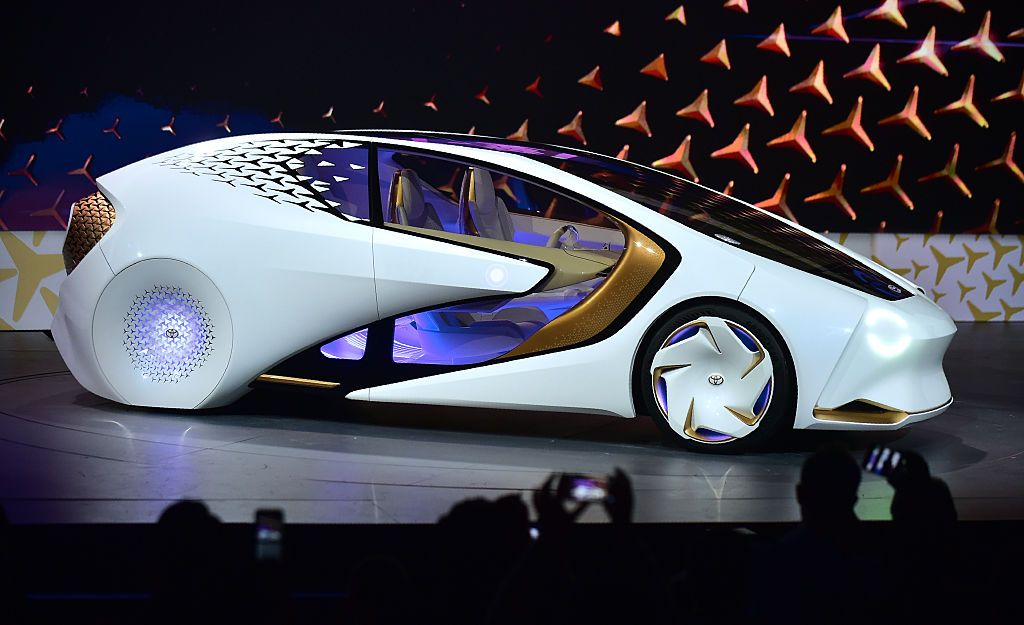The Ghia "Supersonic" design for the Fiat 8V of 1953 was ahead of its time, looking more like cars created five or even ten years later on. Background on Fiat's 8V is here, and I posted on it here, featuring the factory-designed body. This Wikipedia entry credits its design to Giovanni Savonuzzi.
Only a few Supersonics were built, but I was able to see and photograph one at Los Angeles' Petersen Automotive Museum last year. Click on the images to enlarge.
Front three-quarter view of the Supersonic on display the the Petersen Automotive Museum in 2017. The hood is long and there is no bumper to dampen the styling. The long, raised shape along the side containing a heat exhaust vent is a feature found in later Ghia-designed concept cars built for Chrysler Corporation.
An earlier car that might have influenced the Supersonic's styling was the Ford X-100 dream car that debuted early in 1952 as a "pushmobile" that became functional in 1953. It too has jet fighter- inspired details including round tail lights. The Supersonic might have picked up on the large (for that time) overhang and the prominent mid-side character crease.
Here is the original 1952 Fiat 8V Berlinetta, styled in-house by Fiat. Compare the front and rear overhang with that of the Supersonic in the images below.
Note that the Petersen had an entire display zone holding only silver-colored cars.
Rear quarter view. Again, no bumper. The round tail light housings are suggestive of jet fighter exhausts -- part of the Supersonic concept. The creases extending downwards form the micro-tailfins might have a structural origin (hard to say from the photos), but is the only really fussy styling element.
Hood air intakes, real and fake, were common in the early 1950s. If the vent seen here is functional, it must be barely so. Again, hard to tell from the photo.
The Ghia "Supersonic" design for the Fiat 8V of 1953 was ahead of its time, looking more like cars created five or even ten years later on. Background on Fiat's 8V is here, and I posted on it here, featuring the factory-designed body. This Wikipedia entry credits its design to Giovanni Savonuzzi.
Only a few Supersonics were built, but I was able to see and photograph one at Los Angeles' Petersen Automotive Museum last year. Click on the images to enlarge.
Front three-quarter view of the Supersonic on display the the Petersen Automotive Museum in 2017. The hood is long and there is no bumper to dampen the styling. The long, raised shape along the side containing a heat exhaust vent is a feature found in later Ghia-designed concept cars built for Chrysler Corporation.
An earlier car that might have influenced the Supersonic's styling was the Ford X-100 dream car that debuted early in 1952 as a "pushmobile" that became functional in 1953. It too has jet fighter- inspired details including round tail lights. The Supersonic might have picked up on the large (for that time) overhang and the prominent mid-side character crease.
Here is the original 1952 Fiat 8V Berlinetta, styled in-house by Fiat. Compare the front and rear overhang with that of the Supersonic in the images below.
Note that the Petersen had an entire display zone holding only silver-colored cars.
Rear quarter view. Again, no bumper. The round tail light housings are suggestive of jet fighter exhausts -- part of the Supersonic concept. The creases extending downwards form the micro-tailfins might have a structural origin (hard to say from the photos), but is the only really fussy styling element.
Hood air intakes, real and fake, were common in the early 1950s. If the vent seen here is functional, it must be barely so. Again, hard to tell from the photo.



















EmoticonEmoticon